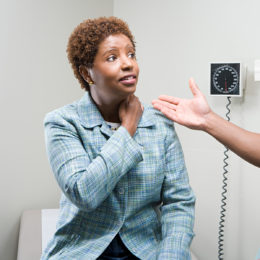The Impact of Social Determinants of Health on Patient Outcomes

The following blog post was written by Shannon Beebe, Manager of Healthcare Operations.
RMS Healthcare is pleased to provide ongoing relevant information on healthcare trends and specific transformation activities. We understand the importance of identifying and assessing Social Determinants of Health and the impact on care delivery and management.
Social Determinants of Health (SDoH) play a very important role in health outcomes of adult and pediatric patients, alike. The ability to influence social determinants largely falls outside of the health care system’s reach. Therefore, a key to address opportunities for health involves collaboration between health care and different industries such as education, housing, and transportation.
What Do We Know About Social Determinants of Health?
The CDC defines SDoH as conditions in the places where people live, learn, work, and play. All of these factors affect a wide range of health risks and outcomes. We know that individuals who live in poverty have limited access to healthy foods, such as fresh fruits and vegetables. We also know that communities with unstable housing, high crime, and substandard educational resources tend to have poor health outcomes.
What Does the Research Say?
Research shows that 80% of patient health outcomes can be influenced by non-medical factors. Therefore, assessing SDoH is not enough. Once assessed, our primary care practices must have the resources to address the social determinants that are affecting their patients. In 2017, the NYS DOH announced the formation of the Bureau of Social Determinants of Health. The goal of this program is to address social determinants utilizing a value-based payment model of care. The VBP SDoH subcommittee created an intervention menu tool and recommendations to supply providers with evidence-based interventions that aim to improve SDoH. Our challenge is implementing these strategies at the practice level and improving health outcomes for all patients.
What Do We Do?
By applying what we already know about SDoH and how they affect individuals in our community, we can not only improve the individuals and population health but can also improve health equity. Healthy People 2020 highlights health equity and equal access to healthcare for all populations.
The first step in addressing SDoH is to assess the needs of your patients. This can be done in a variety of different ways. Screening for SDoH can help identify needs of an individual. The first step is to screen for the 5-core health-related social needs, which according to the AAFP, include housing, food, transportation, utilities (gas, electric), and personal safety. Once you have this information, you can provide the individual with the resources to address their unique needs.
The most evident SDoH is transportation. Whether a patient lives in an urban or rural community, this is a barrier to their healthcare. Many primary care practices have focused on this area to improve health outcomes for their most vulnerable patients. Practice staff set up and confirm transportation for these patients, as well as contacting the patient to remind them of their appointment and pick up time. Practice staff also monitor no-shows for these patients and analyze whether they missed their appointment due to transportation issues or something else. This allows the practice to see the “whole picture” and help the patient prioritize their needs.
How We Can Help
RMS Healthcare is a leading Healthcare Transformation consultant. Our team brings many years of experience in working with clients to pursue PCMH™ recognition, as well as working with vulnerable populations through community-based organizations. We understand what SDoH are and how they impact health outcomes. We also understand how important these issues are to your patient workflow and process to help you ensure that you are operating in the most efficient and effective way.
For more information on how we can help your practice with practice transformation or care management activities, please contact Susan Maxsween, Vice President of Healthcare Consulting & Operations, at SusanM@RMSresults.com or reach her by phone at 1-866-567-5422.
very high quality and useful content .keep sharing such informative information.
Thank you for this awesome information. I’m new to blogging industry. Your Article is really useful for me.
Really nice article, thanks for sharing. I created my first comment based on the knowledge I learned from this article.
I really like your writing. Thanks so much, finally a decent website with good information in it.
thanks for writing this article and your information is very useful to us.
Nice and also informative post to read. Thanks for sharing this valuable content
We’re glad you found this post to be of value! If you’re interested in learning more about Social Determinants of Health and how RMS can work with you, feel free to reach out any time to info@RMSresults.com or give us a call at 315.635.9802. Thanks!